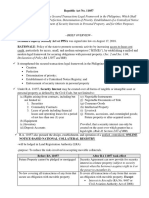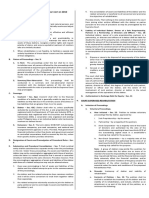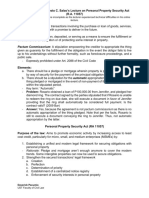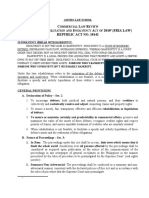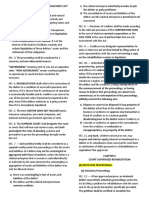Atty. WBC - Personal Property Security Act
Atty. WBC - Personal Property Security Act
Uploaded by
Warren Barrameda ConcepcionCopyright:
Available Formats
Atty. WBC - Personal Property Security Act
Atty. WBC - Personal Property Security Act
Uploaded by
Warren Barrameda ConcepcionCopyright
Available Formats
Share this document
Did you find this document useful?
Is this content inappropriate?
Copyright:
Available Formats
Atty. WBC - Personal Property Security Act
Atty. WBC - Personal Property Security Act
Uploaded by
Warren Barrameda ConcepcionCopyright:
Available Formats
RA 11057: PERSONAL PROPERTY SECURITY ACT (PPSA)
- The law was signed on August 17, 2018.
> State Policy: To promote economic activity by increasing access to credit, particularly
for MSME’s, by establishing a unified and modern legal framework for securing
obligations with personal property.
[ Remember our lesson in Banking Laws 1 when we discussed that debts may either be secured
or unsecured. The primary difference between the two is the presence or absence of collateral.
A debt is secured when the borrower puts up some asset as surety or collateral for the
obligation. It is unsecured if it has no collateral backing.]
> Scope and Coverage:
Under this law, PERSONAL PROPERTIES OR MOVABLE PROPERTIES as
collaterals now include, among other things:
- Deposit accounts
- Accounts receivables
- Negotiable instruments
- Security certificate or electronic securities
- Inventory
- Equipment
- Consumer goods
- Livestock and other agricultural products,
- Vehicles
- Intellectual property rights
- Future property
Essentially, the law covers all transactions of any form that secure an obligation with
movable collaterals, EXCEPT interests in aircraft (subject to RA 9497 or the Civil Aviation
Authority Act of 2008) and interests in ships or vessels (subject to RA 1521 or the Ship
Mortgage Decree of 1978).
Please take note that the PPSA repealed, amended, and modified the provisions of the
Chattel Mortgage Law, and the provisions of the Civil Code on Pledge and Chattel
Mortgage, as well as some of the provisions on Concurrence and Preference of Credits!
The following laws which are inconsistent with the provisions of this Act are hereby repealed,
amended, or modified:
(a) Secs. 1 to 16 of Act No. 1508 or the Chattel Mortgage Law;
(b) Arts. 2085-2123, 2127, 2140-2041, 2241, 2243, and 2246-2247 of the New Civil Code;
(c) Sec. 13 of RA 8556 or the Financing Company Act of 1998;
(d) Secs. 10, 114-116 of PD No. 1529 or the Property Registration Decree; and
(e) Sec. 5 (e) of RA No. 4136 or the Land Transportation and Traffic Code.
> What is a SECURITY INTEREST?
A property right in collateral that secures payment or other performance of the
obligation, regardless of whether the parties have denominated it as a security interest, and
regardless of the type of the asset, the status of the grantor or secured creditor, or the nature of
the secured obligation.
> Stages in the Life of Security Interest:
1. Creation – Security interest is created by a security agreement.
2. Perfection – Security interest created becomes effective against 3rd parties the moment it
is perfected which can be by 3 means:
a) Registration of a notice with the Registry;
b) Possession of the collateral by the secured creditor; and
c) Control of investment property and deposit account
*Please note that security interest in any tangible asset may be perfected by registration
or possession while in investment property and deposit account may be perfected by
registration or control.
How security interest may be perfected by control?
> Creation of security interest in favor of the deposit-taking institution
> Conclusion of a control agreement
> Notation of the security interest in the books maintained by or on behalf of the issuer
3. Enforcement – The secured creditor may sell or otherwise dispose of the collateral either
by public or private sale. The debtor is also required to satisfy any deficiency. Previously,
the Law on Pledge provides that the foreclosure of a pledge extinguishes the debt and the
secured creditor is no longer entitled to recover any deficiency.
> Priority of Security Interest:
Sec. 17 of the PPSA provides the general rule that “the priority of security interests and
liens in the same collateral shall be determined according to time of registration of a notice or
perfection by other means, without regard to the order of creation of security interests and
liens.” However, with respect to bank deposits, specific rules are provided for under Paragraphs
(a) to (d) of Sec. 18.
Under the PPSA, the Land Registration Authority (LRA) is the government agency
tasked to establish a new registry that will enable registration and the searching of
notices on security interests.
You might also like
- Reviewer Personal Property Security ActDocument34 pagesReviewer Personal Property Security ActSbl Irv100% (19)
- AMLA Latest Amendments 2023 (Anti-Money Laundering Act Philippines)Document10 pagesAMLA Latest Amendments 2023 (Anti-Money Laundering Act Philippines)Atty. Javier Law Vlog - Law Lectures for Students80% (5)
- UCC 1 Security AgreementDocument1 pageUCC 1 Security Agreementtlh78great100% (7)
- Omniversal Security Agreement: Non-NegotiableDocument27 pagesOmniversal Security Agreement: Non-NegotiableAlberto86% (14)
- Understanding RA 11057 and Its Effect With NCC and Prior LawsDocument2 pagesUnderstanding RA 11057 and Its Effect With NCC and Prior LawsKym Algarme100% (2)
- PPSA SummaryDocument9 pagesPPSA Summarykarl100% (18)
- FRIA Law Reviewer PDFDocument10 pagesFRIA Law Reviewer PDFJaylordPataotao100% (1)
- Revised PPSA V. Chattel Mortgage, Pledge, Preference of CreditDocument8 pagesRevised PPSA V. Chattel Mortgage, Pledge, Preference of CreditJj Jumalon75% (4)
- LC Procurement Agreement DraftDocument25 pagesLC Procurement Agreement DraftOndieki Obare JuniorNo ratings yet
- Property Security Act", Sec. 4)Document29 pagesProperty Security Act", Sec. 4)Rion Margate60% (5)
- Notes From Dean Salaos Lecture On Personal Property Security ActDocument9 pagesNotes From Dean Salaos Lecture On Personal Property Security ActCassie GacottNo ratings yet
- Financial Rehabilitation and Insolvency Act of 2010Document29 pagesFinancial Rehabilitation and Insolvency Act of 2010ethelandicoNo ratings yet
- Personal Property Securities Act RA 11057Document77 pagesPersonal Property Securities Act RA 11057Ann QuirimitNo ratings yet
- RA 11057 - Personal Property Security ActDocument17 pagesRA 11057 - Personal Property Security ActStudent AccountNo ratings yet
- Personal Property Security Act Outline StudentDocument10 pagesPersonal Property Security Act Outline StudentJosiah BalgosNo ratings yet
- Financial Rehabilitation and Insolvency Act (Fria) : Atty. Ivan Yannick S. Bagayao Cpa, MbaDocument40 pagesFinancial Rehabilitation and Insolvency Act (Fria) : Atty. Ivan Yannick S. Bagayao Cpa, MbaChristoper BalangueNo ratings yet
- Oblicon Crash CourseDocument20 pagesOblicon Crash Coursekero keropiNo ratings yet
- C L R F R I A 2010 (Fria Law) Republic Act No. 10142: Ommercial AW Eview Inancial Ehabilitation AND Nsolvency CT OFDocument27 pagesC L R F R I A 2010 (Fria Law) Republic Act No. 10142: Ommercial AW Eview Inancial Ehabilitation AND Nsolvency CT OFAngela AcompañadoNo ratings yet
- General Banking Law of 2000Document19 pagesGeneral Banking Law of 2000allannica100% (1)
- Philippine Competition ActDocument42 pagesPhilippine Competition ActJenMarlon Corpuz AquinoNo ratings yet
- 2019 Divina FRIA 070919 MJRSIDocument15 pages2019 Divina FRIA 070919 MJRSIMuhammadIbnSulu100% (3)
- RFBT 05 17 Special Corporate LawsDocument65 pagesRFBT 05 17 Special Corporate LawsHarold Dan AcebedoNo ratings yet
- Reviewer Financial Rehabilitation and Insolvency ActDocument18 pagesReviewer Financial Rehabilitation and Insolvency ActShalala HernandezNo ratings yet
- Credit Transactions Final ReviewerDocument5 pagesCredit Transactions Final ReviewerPJ HongNo ratings yet
- CTDI Final Pre-Board Special Laws Only PDFDocument4 pagesCTDI Final Pre-Board Special Laws Only PDFPatricia Marie MercaderNo ratings yet
- Warehouse ReceiptsDocument15 pagesWarehouse ReceiptsBiboy GSNo ratings yet
- Financial Rehabilitation and Insolvency ActDocument32 pagesFinancial Rehabilitation and Insolvency ActZen Daniel100% (4)
- Philippine Competition ActDocument6 pagesPhilippine Competition ActRay MalingiNo ratings yet
- PDIC Law - Lecture NotesDocument4 pagesPDIC Law - Lecture NotesJolina Ayngan100% (2)
- CorpoDocument103 pagesCorpoAnn 2020100% (1)
- Lemon Law Q & ADocument25 pagesLemon Law Q & ADanzen Bueno Imus100% (1)
- Unclaimed Balances Law Lecture NotesDocument1 pageUnclaimed Balances Law Lecture NotesmarkNo ratings yet
- PPSA NotesDocument3 pagesPPSA NotesKing Badong100% (1)
- AMLA - Ateneo Law ReviewerDocument10 pagesAMLA - Ateneo Law ReviewerBryan KennethNo ratings yet
- Notes in Anti-Money Laundering Act Atty. DJ: Tarlac State UniversityDocument15 pagesNotes in Anti-Money Laundering Act Atty. DJ: Tarlac State UniversityCatherine SimeonNo ratings yet
- FINANCIAL REHABILITATION and INSOLVENCY ACT of 2010Document9 pagesFINANCIAL REHABILITATION and INSOLVENCY ACT of 2010Lara Delle0% (1)
- Philippine Competition ActDocument31 pagesPhilippine Competition ActJam RxNo ratings yet
- Mock Bar Examination in Negotiable Instruments LawDocument10 pagesMock Bar Examination in Negotiable Instruments LawGilbertGalope0% (1)
- Fria LawDocument3 pagesFria LawjsanbustaNo ratings yet
- NOTES ON TILA - Truth in Lending Act (RA 3765)Document8 pagesNOTES ON TILA - Truth in Lending Act (RA 3765)edrianclydeNo ratings yet
- NOTES - Philippine Competition Act (PCA)Document6 pagesNOTES - Philippine Competition Act (PCA)JUAN MIGUEL GUZMANNo ratings yet
- 2019 Bar Notes On Anti-Money Laundering PDFDocument10 pages2019 Bar Notes On Anti-Money Laundering PDFAnonymous kiom0L1Fqs100% (1)
- Fria ReviewerDocument31 pagesFria ReviewerWhere Did Macky Gallego100% (4)
- Republic Act No 10607Document7 pagesRepublic Act No 10607Romel TorresNo ratings yet
- Insurance Law Claims Settlement and Subrogation NotesDocument5 pagesInsurance Law Claims Settlement and Subrogation NotesTenten ConanNo ratings yet
- AMLADocument8 pagesAMLADiana Faye CaduadaNo ratings yet
- Personal Property Security ActDocument18 pagesPersonal Property Security ActFrancis PunoNo ratings yet
- Where Depositary Incapacitated and The Depositor CapacitatedDocument2 pagesWhere Depositary Incapacitated and The Depositor CapacitatedJirah Lou-Anne SacliwanNo ratings yet
- REM, Antichresis, Chattel Mortgage - Notes and CasesDocument45 pagesREM, Antichresis, Chattel Mortgage - Notes and CasesCelestino LawNo ratings yet
- Notes Commercial LawDocument80 pagesNotes Commercial LawCarlos JamesNo ratings yet
- 1 - New Central Bank ActDocument19 pages1 - New Central Bank Actrandyblanza2014100% (2)
- Anti Money Laundering ActDocument14 pagesAnti Money Laundering ActKatherine Dizon100% (1)
- Concurrence and Preference of CreditsDocument4 pagesConcurrence and Preference of CreditsAlyssa Mateo100% (5)
- Ra 1405 NotesDocument11 pagesRa 1405 NotesLisa BautistaNo ratings yet
- Topic 6: Provisions Common To Pledge and MortgageDocument26 pagesTopic 6: Provisions Common To Pledge and Mortgagehyunsuk fhebieNo ratings yet
- PDIC LawDocument27 pagesPDIC LawSuzette VillalinoNo ratings yet
- Insolvency Proceedings Under FRIADocument13 pagesInsolvency Proceedings Under FRIAAnonymous XvwKtnSrMR100% (1)
- Secured Transactions Bar Review NotesDocument51 pagesSecured Transactions Bar Review NotesCJVNo ratings yet
- Notes On PPSADocument20 pagesNotes On PPSAMaeca Angela SerranoNo ratings yet
- Ppsa Ra 11057Document81 pagesPpsa Ra 11057Ma. Gemille NopradaNo ratings yet
- RA No 11057 - Personal Property Security Act: Chapter 1. Definitions and ScopeDocument17 pagesRA No 11057 - Personal Property Security Act: Chapter 1. Definitions and ScoperehnegibbNo ratings yet
- REPUBLIC ACT NO. 11057, August 17, 2018Document16 pagesREPUBLIC ACT NO. 11057, August 17, 2018edgardo100% (1)
- PPSA and PPSA Rules PDFDocument5 pagesPPSA and PPSA Rules PDFTricia Montoya0% (1)
- Company Law 2Document17 pagesCompany Law 2Dhiraj T BhalaviNo ratings yet
- Personal Property Security Act Outline StudentDocument10 pagesPersonal Property Security Act Outline StudentJosiah BalgosNo ratings yet
- Securitisation and Its Impact On The Indian Banking SectorDocument18 pagesSecuritisation and Its Impact On The Indian Banking SectorMahesh SatapathyNo ratings yet
- Oregon Rules of Civil ProcedureDocument127 pagesOregon Rules of Civil ProcedureGary Krimson100% (1)
- KITV Asset Purchase AgreementDocument69 pagesKITV Asset Purchase AgreementHonolulu Star-AdvertiserNo ratings yet
- IBC v. SARFAESI Act - Interplay and OverlappingDocument10 pagesIBC v. SARFAESI Act - Interplay and OverlappingIshitaNo ratings yet
- United States Court of Appeals, First CircuitDocument19 pagesUnited States Court of Appeals, First CircuitScribd Government DocsNo ratings yet
- Module 2 Paper 5 CRILW PI Book PDFDocument328 pagesModule 2 Paper 5 CRILW PI Book PDFShakti PanigrahiNo ratings yet
- All Chapter Download Test Bank For Real Estate Law 9th Edition Aalberts 1285428765 9781285428765Document40 pagesAll Chapter Download Test Bank For Real Estate Law 9th Edition Aalberts 1285428765 9781285428765jhenzunykatNo ratings yet
- Instructions For National UCC Financing Statement (Form UCC1)Document3 pagesInstructions For National UCC Financing Statement (Form UCC1)Netmate CheckmateNo ratings yet
- OC10-Appx5 Third Party Custodian AgreementDocument2 pagesOC10-Appx5 Third Party Custodian AgreementPantsNo ratings yet
- Principal Terms and ConditionsDocument43 pagesPrincipal Terms and ConditionsNABILAH SYAHBUDINNo ratings yet
- Von Duprin Price Book Revised 8 - 14Document146 pagesVon Duprin Price Book Revised 8 - 14Security Lock DistributorsNo ratings yet
- 10000020383Document77 pages10000020383Chapter 11 DocketsNo ratings yet
- FZCO-MOA & AOA 28-Dec-2022 18 - 10 - 50Document17 pagesFZCO-MOA & AOA 28-Dec-2022 18 - 10 - 50Tom JobNo ratings yet
- Surana and Surana National Corporate Law Moot Court Competition, 2019Document28 pagesSurana and Surana National Corporate Law Moot Court Competition, 2019Khushi AgarwalNo ratings yet
- 0 042010 Notes - Brandon AdamsDocument17 pages0 042010 Notes - Brandon AdamsCK in DC100% (6)
- Document Registration System in Sri LankaDocument6 pagesDocument Registration System in Sri LankaEranga GunarathnaNo ratings yet
- Edited Dlsu College of Law Syllabus 2Document13 pagesEdited Dlsu College of Law Syllabus 2khristel_calantoc_57No ratings yet
- PROPERTY MemaidDocument128 pagesPROPERTY MemaidKatrina PerezNo ratings yet
- Indian Institute of Banking & FinanceDocument14 pagesIndian Institute of Banking & Financekarthik100% (1)
- Ashima Goyal and Ors Vs Reserve Bank of India Anr On 19 October 2022Document4 pagesAshima Goyal and Ors Vs Reserve Bank of India Anr On 19 October 2022sathish15779No ratings yet
- Adversary Proceeding With George CannanDocument86 pagesAdversary Proceeding With George CannanValueSearcher70No ratings yet
- EPC ContractDocument26 pagesEPC ContractMuani Hmar100% (1)
- Lecture No. 11 Receivership 1Document11 pagesLecture No. 11 Receivership 1NIYEE LYDIANo ratings yet
- Timberlane Case FullDocument21 pagesTimberlane Case FullDiane Cabral CalangiNo ratings yet
- Modes of Charging SecuritiesDocument11 pagesModes of Charging SecuritiesKopal Agarwal50% (4)
